#create depth
Explore tagged Tumblr posts
Text
I'm definitely going to have to finish Black Sails especially since Once Upon a Time has been completely disappointing in terms of pirate materials
#anti ouat#black sails#they fucked up treasure island#and peter pan!#so angry!#two of my favourite pirate stories#i'm sorry but captain hook has been a disappointment#not because he as a character is#but he's literally NOT his literary counterpart#he's just Captain Hook in name#i can accept Regina as Evil Queen because she embodies it both by the actress and the writing#AND she adds to the role#create depth#same with the rest of the Snow White cast#BUT THEY FUCKED UP EVERYTHING ELSE#except for Rumplestiltskin#red riding hood#basically all the tales explored in S1#it just went downhill after S2 I swear#or S3 i guess#idk guys i was disappointed with Neverland#but compared to later seasons yeah Neverland was Once's highpoint#but tbh I think only due to the show value Pan gave with the twist about who he is#personally i thought that twist diminishes the depth of what Peter Pan is supposed to represent#and betrays the character and the reason for his creation#he hates adults because he felt betrayed and abandoned by adults#but ouat he's an adult who represents the worst of adults in the eyes of a child#i do get what malcolm represents and can't deny that it's clever but it's i just hate it okay
12 notes
·
View notes
Text
phil putting on any sort of dress or long wig: i am confident enough in my own gender and sexuality that this doesn’t affect me. toxic masculinity is a prison and there’s no reason in our modern society that we should be constrained by it. i can be a man and still enjoy traditionally feminine things and i don’t care what anyone else thinks
dan putting on any sort of dress or long wig: i’m a woman now
#phil in a dress is just phil in a dress#but put dan in a dress and he will create a character with an in depth backstory and remain in character until the dress comes off#dan and phil#phan#mine
3K notes
·
View notes
Text
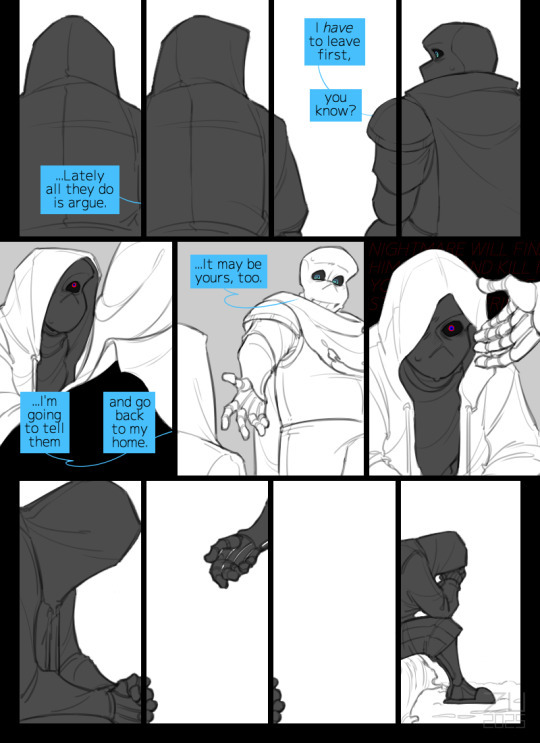
last date
[4/17] Swap by popcornpr1nce
Murder by ask-dusttale
#zu art#comic#murderswap#murder!sans#us!sans#swap!sans#underswap!sans#birthday#undertale#undertale au#utmv#dustberry#come along come along with me#come along now come along and you'll see#what it's like to be free#;w;#(chaotically created a playlist for them while drawing xp#''happy birthday'' Zu says and draws the most angst ever#((post) dark) cream tops ofc but them? they're lulled in the depths of my heart
673 notes
·
View notes
Text

Cows :)
These are based off a video of a cow sniffing the camera from @bovineblogger
#GOD I WISH PHOTOS RETAINED THE DEPTH OF COLOUR#right cow has green shadows and a purble nose but it will not come through 😔#cawis creates
642 notes
·
View notes
Text
On my rewatch of TLOU I realized there were some details that I missed before that help to paint this huge picture about the importance of the preceding Tess/Joel relationship. The first and most obvious is that Joel mentions passingly that he and Tommy met Tess pretty early on, and it sounds like she stayed with him when every other group they were in fell apart, and even when his own brother left. So they’ve been surviving together for at LEAST 15 years, probably longer than his daughter was even alive, which is a length of time I just didn’t fully process before.
We never hear the full goodbye/suicide letter from Bill, but a lot of people have pointed out that over Joel’s shoulder you can see Tess’s name mentioned at least twice at the end — including something about her deciding what to do. We know that basically every time we saw Tess directly interacting with Joel before she died, she was the one giving him directives and making the final decisions. She says outright that he listens to her. This is not a man who trusts fucking anybody after everything he’s been through. But he trusts Tess. She comes up behind him in bed while he’s sleeping, and in a world of raiders and robbers where hypervigilance is a necessity, he barely even stirs.
Now, one of her last lines before she dies is “I never asked you for anything, not to feel the way I felt—“ and he tries to say something and she shuts him down. But here’s what gets me: before that, before they realize she was bit, she turns around and in her dying frantic anger she yells “that is NOT MY HOME!” about the QZ. And it’s like okay… where else could she be thinking about, if she’s spent all these years on the road with different groups, with Joel, and then at least a decade in the QZ? What is she defining as home right now? Why is this correction so intense? And it could be about Detroit, about where she came from and isn’t (apparently) attempting to go back to. But then. But then she turns and she looks directly at Joel. And she’s got the most tragic expression on her face. And I wonder if in that moment Joel knew she meant that he was her home, even if she had never said it that openly before. Wherever he went, she would go. Haring off on a wild chase after his brother across the country? She’s there. She’ll do anything to make it happen. She’ll beg and barter and kill for this truck battery, for a mission she doesn’t even have half the same stakes in. She was his direction and his driving force and a safe place for him, but he was her home.
Thinking about this almost changed the tenor of the remaining story with Joel and Ellie to me. The hospital massacre felt perfectly in character the first time I watched, but when I rewatched with both the Sarah and the Tess story in the forefront of my mind it felt even more fucking inevitable. Joel is Orpheus. This couldn’t have gone any other way. He could never have done anything else. He has failed the two most important women in his life. He has failed a daughter, and he has failed a partner twice over- first by letting her die, and second by letting her die believing she was unloved. How can he fail Ellie now? He has to burn the entire world, tell any lie, just to keep her alive. There is no other option, no other outcome. There is no living Joel post-canon without the hospital massacre.
And the revenge for it will be what kills him.
#my interpretation could be completely wrong ofc#let’s consider this post to be at least partly fanon tbh#anyway craig mazin the art you create is phenomenal the stories you tell are beautiful in their depth.#the last of us#tlou#joel tlou#tess servopoulos#joel/tess#tess/joel#joel miller#the last of us hbo#tlou hbo#tlou 2#tlou part 2#my meta#mine#long post
335 notes
·
View notes
Text
What do you think if someone knocks on the door of Cat, Laila, and Jean's new apartment, and Jeremy opens it, very surprised because it's late, and Cody stands there looking gloomy?
And then Cody fakes a smile and says,
"Hi, Captain. Sorry to interrupt. Hey… is Jean in?" Jean, of course, comes out from behind Jeremy, and the two look into each other's eyes without much communication. "Maybe you were right," Cody says.
No one understands, but Jean says,
"We were going to have dinner. We have food for more people. Come on," and Jean invites Cody in.
Jeremy, Cat, and Laila are very happy that Cody came there, although they don't understand what's going on. Whatever it is, only Jean seems to know, and Cody only came there to be with Jean.
When they finish dinner, Jean and Cody go out onto the porch and talk for a long time. Jean says Cody is staying over. They still don't know what's going on, but Jeremy can't take his eyes off this Jean who comforts Cody and has become someone else's confidant.
Jeremy can't stop smiling in admiration.
#jean moreau#the sunshine court#all for the game#the golden raven#aftg#tgr#tsc#jeremy knox#jerejean#cody winter#I want to see more of the relationship between Cody and Jean#Cody seems to have doubts about Anaya and Pat and Jean and he talk when they are more confident#Jean is the only person he tells why he has doubts.#Jean understands that it's difficult and Cody knows that it's difficult for Jean to look at Jeremy.#Jean encourages him to be honest and that creates a difficult but necessary situation.#Jean seems the only realist in Cody's relationship with Anaya and Pat#Everyone says it's okay#but Jean is the only one who understands that it's much harder than that.#The Trojans know that Pat Anaya and Cody are good#but Jean only knows Cody in depth.#Jean doesn't like the Trojans pressuring Cody with their happy endings and neither does Cody.#Cody needs to be allowed to think and Jean lets him think#They understand each other and Cody feels relaxed with Jean#Jean is Cody's defender and if Anaya and Pat want to be by Cody's side#they have to give a ring first.#Jean wants Cody to have his ring just like Pat and Anaya have it.#If they want Cody on equal terms#Cody has to have a ring too.
117 notes
·
View notes
Text
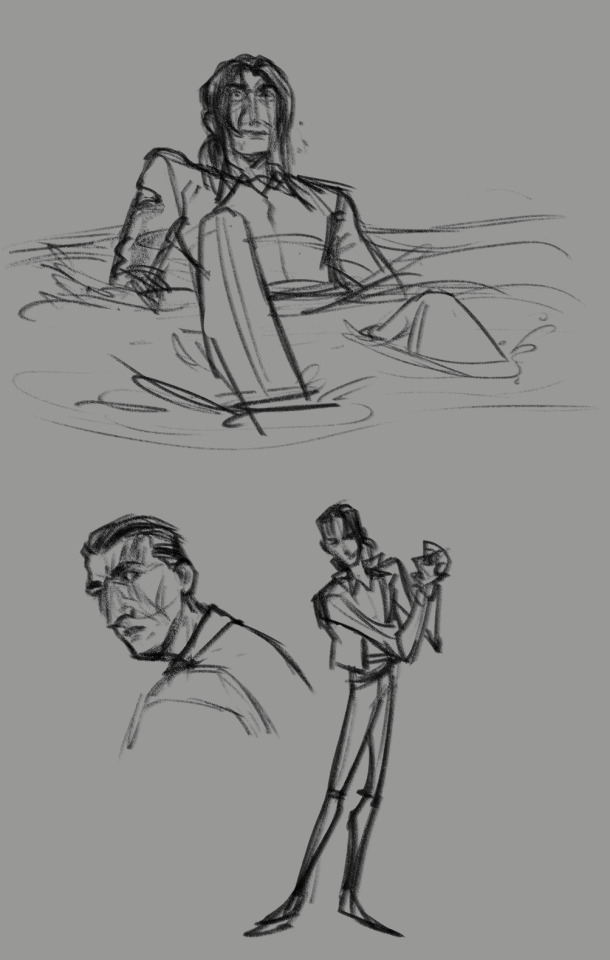
im begging does anyone have like, any sort of community or discord server or something hghaiuflkjshhlkghakhaklsd i have a need to scream about my boy who has every disease
#or at least just post art of him#silco#arcane silco#doodles#digital art#arcane season 2#arcane season 2 spoilers#just bc it includes the s2 young silco design#im still kinda insane about him actually#they really really really designed a guy SPECIFICALLY for me to enjoy#a man with long dark hair and striking eyes and sharp features#augh like i think that's literally just.#hrhwgilukghalwk#also someone pointed out the darts game tracker and how (iirc) silco was winning and i love it#that's hilarious#bro has no depth perception and is still beating both benzo and vander#(or at least in my hc he's got no depth perception bc the yellow iris eye is a glass eye)#also something about him having an open collar in the shots where he's clearly comfy and happy#and then. post attempted murder. he's closed up. buttoned up. hoh#im insane about him#the artists went out and created a guy JUST for me
272 notes
·
View notes
Text

some golden guards + caleb
i wanted to take a break and do some character design of a few golden guards based off of some of the ones seen briefly in canon. i also drew hunter and caleb as references for faces and stuff. i tried to make them as similar as possible, but also looking very individual to one another. since belos claimed that hunter looks the most like caleb, i tried to stay true to that while keeping the other three looking similar but not quite as identical. anyways i love them <3 they’re like the most mentally ill family ever to me
these weren’t supposed to be real ocs or anything but then i ended up giving them names and backstories and so i wrote a little about them aaaand now im obsessed. i will try to make a full body ref for them, especially alistair and/or constance, if i have time

i apologize for my godawful handwriting 💔
#the owl house#the owl house fanart#the owl house oc#hunter toh#toh hunter#hunter noceda#hunter deamonne#caleb wittebane#the golden guard#grimwalker#digital art#digital illustration#character design#oleafia art#sorry if the descriptions don’t make sense i was trying to write as much as i could but i ran out of room lmao#if i make the full body refs i can make a more in depth post about each of their lives#i’m also so happy with how i drew hunter in this#he’s just a little guy :(((#also i’m pretty sure it’s canon grimwalkers can be created at any age#idk how this is controlled but i’m assuming hunter was created as a baby or toddler and raised by bells as we know#i think he was def the youngest gg and probably the youngest grimwalker#constance was like 23 or something when she was ‘born’ and then died at like 36#victor was similar but lived til 40#ali was ‘born’ at 17 or 18 idk#and died at 25#i didn’t have room to write this but i think for ali belos pulled the ‘ur parents were killed by wild witches and stole ur memories’ trick#and was like ‘omg i’m so generous for giving ur worthless ass a job since ur a homeless teen with no magic’#and ali was like ok so that makes no fucking sense and decided to just fuck around with belos for whatever short life he had#alistair’s personality and parts of his backstory were inspired by a fanfic i read recently by elliptical on ao3#their works r SO GOOD u need to check them out
290 notes
·
View notes
Text
Has tumblr ever heard of randyverse before
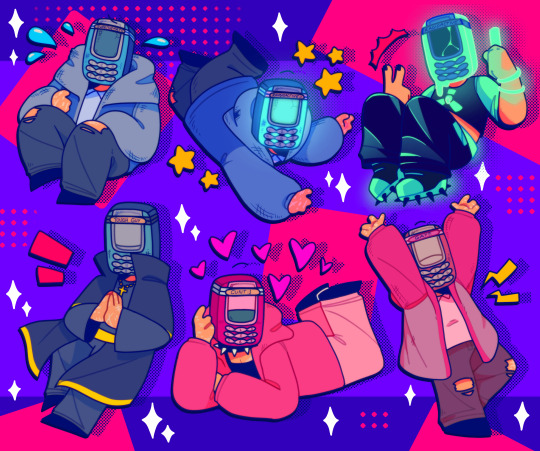
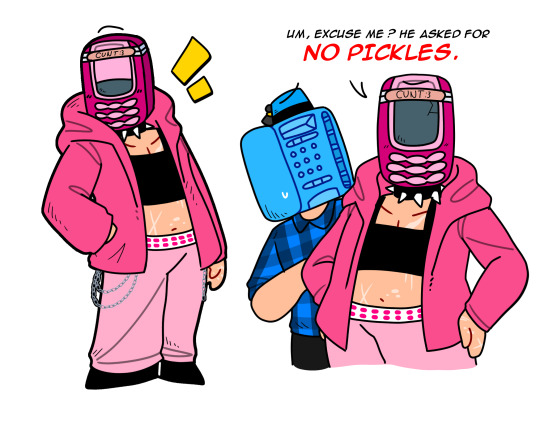
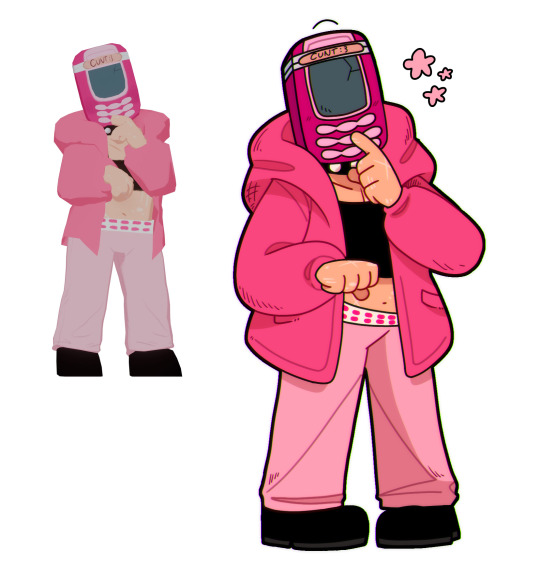
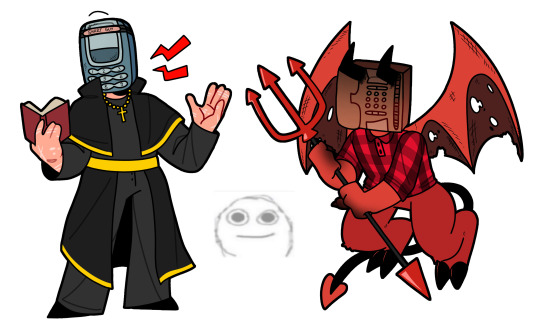
first drawing top right randioactive design by my friend @/boiled_bagel, cunt randy concept by @/soot_zach, the 3D design in the third pic is by my bud @/Canned_Clown (ALL 3 OF THESE PPL R ON TWITTER BTW !!) n priest randy + the cunt randy design r both by me ^___^
#dialtown#dialtown fanart#gina's art shenanigans#randy jade#oliver swift#oli is there too I GUESS#gonna go more in-depth on priest randy some day who's actually from an au I created called Devil's Advocate :P
553 notes
·
View notes
Text

Jotaro grunts as they get to their room and, as Joseph warned, there is only one queen sized bed. His only solace is that Joseph and Polnareff will be dealing with the same predicament. There only being one hotel in a drive-through town makes their room choices limited…
He sighs, setting his bag down on the floor of one side of the mattress, Kakyoin silently taking the other.
Kakyoin digs through his duffel then, likely for his pajama set given the hour, the blue of dusk fading to the purple of night through the window, while Jotaro scans the length of the bed, then himself, considering if his full length will fit. Kakyoin's not the shortest guy either, he muses as he watches Kakyoin return to his full height from his duffel, his pajamas in hand.
Jotaro hums, moving to sit on the bed, only for Hierophant to manifest and gently hold him back by the shoulder.
He jumps, whipping his head up, and Kakyoin smiles, amused, before saying, "Hey, we're gonna sleep there. Try not to lie down on the bed until we're both showered, okay?"
Jotaro grunts. "You've never cared if I shower before sitting down before."
Kakyoin raises a brow, snorting. "We've never shared a bed before." Jotaro shudders, hair rising along the back of his neck. "Come on, I don't want to sleep on dusty sheets." Jotaro grimaces at the description, his skin suddenly itching.
"Don't say it like that..." Jotaro grumbles then, and Kakyoin raises a brow.
"Dusty sheets?"
Face heating up a bit, Jotaro scowls, crossing his arms. "No."
Kakyoin's brows pinch, gaze scanning over him, and Jotaro squirms. "What, then?"
"Don't act like an idiot," Jotaro tries to bite, but his voice wavers, and Kakyoin's face screws up a bit. Jotaro ducks his head, tugging the brim of his hat down. "Look, I won't sit on the bed until I shower. So you should go first and-"
"Sharing a bed?"
Jotaro goes still.
Kakyoin blinks in Jotaro's periphery, before he snorts. Jotaro whips his head up, embarrassment riding up his spine, making him grit his teeth against its waves.
"What?" He snaps, and Kakyoin just snorts again. "It was weird to say!"
Kakyoin snickers, but his eyes are crinkled with his smile, and some of the anger in Jotaro's chest falters. The embarrassment certainly doesn't, though. "I won't- kehehe, I won't say it again, but why does it bother you so much?" Kakyoin giggles.
Jotaro glares at him, letting out a harsh exhale, before he ducks his head again, adjusting his arms against his chest. "Just... It makes us sound like we're..." his voice gets hushed, almost in a whisper, "... married... or something..."
Kakyoin blinks, lips parting, and some color sinks into his cheeks then, and Jotaro feels a little vindicated.
But then he says, "Jeez, Jojo, you think about us getting married often?" And Jotaro's back to being the reddest in the room, tugging his hat down over his eyes so sharply he almost rips it off.
"Good fucking grief-" Jotaro shakes. "Kakyoin-"
Kakyoin giggles again, and it's such an ugly sound, Jotaro wishes it wouldn't set his blood on fire. But, he supposes, he already feels much too warm, and at least this is a nicer heat than that of embarrassment.
Unfortunately, such a thought only brings some shame into the mix, and Jotaro rolls his eyes viciously at himself.
"Why- why would I think about us getting married?" Jotaro spits out, trying to get away from his thoughts. "We're both men."
Kakyoin raises a brow at him again and Jotaro sort of wishes he would stop doing that, because everything in his body cavity from the top of his chest to the seat of his hips feels like liquid. "It's not legal at home, sure, but people still find ways to get functionally married," Kakyoin says.
Jotaro feels like he's skipped the last step of a stairwell. "Huh?"
Kakyoin studies him for a moment, and Jotaro wishes he would drop it. He wishes for once, Kakyoin would leave well enough alone and shrug, take his shower, and let Jotaro drown out his embarrassment with a cold shower of his own.
Kakyoin's not his friend because he behaves accordingly, though.
"Jotaro... men get married," Kakyoin says. Jotaro sort of wants to take off his coat, with how much he's sweating, but the thought of showing any skin right now makes his heart jump to his throat, so he keeps it on.
"With- with wives," Jotaro agrees, frowning at his own shakiness. What, exactly, is he so nervous about?
Kakyoin tilts his head. "With other men," he clarifies, and for some reason, Jotaro feels a shot of adrenaline.
"How?" Jotaro asks, voice a little too desperate, and he turns then, sick of humiliating himself. He shoves his hand into his pocket, pulls out his cigarettes and lighter, and moves to the window, shoving it open with his free hand and sitting stiffly in an old wooden chair placed nearby, technically going with a desk in the corner.
It’s quiet as Jotaro flips the lip of his carton open and slides a cigarette out. He clicks his lighter to life, brings it to the end of his cig, and inhales. The smoke swirls into his lungs and Jotaro holds onto the burn, trying to will all his embarrassment to join it as he exhales it out, coughing slightly.
He jumps when Kakyoin’s hand is on his shoulder then, whipping his head up. Kakyoin raises his hands in a surrendering gesture, and Jotaro sighs. Eying him, Kakyoin sits down on top of the desk, the old wood creaking underneath his weight.
They stare at one another for a second, and Jotaro takes another drag, spitting his smoke outside the window.
“Does it… bother you?” Kakyoin asks quietly.
Jotaro blinks, turning back to Kakyoin. “What?”
Kakyoin sends him a flat look, but still answers, “Men getting married. To other men.”
Jotaro is shaking his head no before he realizes, and he freezes, gritting his teeth at his own anxiety. “No, I- no.”
Kakyoin stares at him, hard, eyes scraping over every pore in Joaro’s face it feels like, and Jotaro adjusts in his seat, glancing back outside to avoid the ultraviolet of Kakyoin’s gaze. Finally, Kakyoin’s brows pinch, and he leans forward a bit. “Then what’s wrong?”
“Just-” Jotaro shakes his head. What was wrong? What wasn’t wrong? His mom is dying halfway across the world and his soul is a ginormous purple monster of incredible strength, he needs to kill or be killed by the most insane people he’s ever seen, and the boy in front of him makes him so twisted up inside Jotaro’s half convinced he’s developing an acute form of scoliosis. Jotaro sucks in a breath. “I just didn’t know that was… allowed.”
Kakyoin’s brows pinch further. “... Allowed?”
Jotaro sucks in another breath of cigarette smoke instead of clarifying.
Kakyoin stares at him before leaning back again. “Jotaro, you know gay people just… exist?”
“I know-” Jotaro sucks in a breath. “I just-” Am I allowed to look at you like this? Are you allowed to make me feel like this?
Kakyoin tilts his head, and his bang swings, and Jotaro’s fingers twitch, his cigarette nearly slipping out of his hand. He fumbles, catching it, only to hiss and he burns himself with the filter. He shoves the cigarette into his mouth and crosses his arms, glaring at the floor. Kakyoin politely ignores it, but he does bring a hand to his mouth. Jotaro glares at the glossy wooden paneling.
“Jotaro,” Kakyoin prompts, and Jotaro’s shoulders hunch up to his ears, but he glances up at Kakyoin’s face anyway. He wonders when he became so obedient when it came to Kakyoin, and he shudders at the thought. “You know it’s not something that needs permission, right?”
Jotaro twitches. The ash in his throat is making his mouth dry.
“Jotaro,” Kakyoin continues, and Jotaro jerks again, “do you know men can just- love other-?”
“Kakyoin,” Jotaro interrupts, his voice hoarse from the smoke, and Kakyoin stops talking. Jotaro takes a few inhales of his cigarette, his nose burning, before he brings a hand to his mouth and takes it out again. “I just- I never- I never see it?” It sounds juvenile, but Jotaro isn’t sure how else to explain.
Kakyoin’s face softens a little then and Jotaro twitches again, his skin itching. “It’s not really broadcasted, no, but,” Kakyoin shrugs then, leaning back on his palms, and Jotaro tries not to think. “It still happens. People can still meet… and fall in love…” Kakyoin’s cheeks get a little pink then, and Jotaro really tries not to stare, but he’s exhausted and enraptured and scared and he can’t look away. “And even if it’s not… conventional, they can still get their happy endings.” Kakyoin locks eyes with Jotaro then, and Jotaro’s breath hitches in his throat. “And even then… you know you don’t need to get married to be in love? Again, unconventional, but it’s still an option… The love is there either way, just like with a man and woman.”
Kakyoin tilts his head and Jotaro’s starting to wonder if he’s doing it on purpose, to make his bang swing like that, to make it caress his face and make Jotaro twitch like he’s being electrocuted. “We’ve never been the most conventional people in the first place anyway, huh, Jotaro?” He murmurs, and Jotaro damn near falls out of the chair with how hard he shudders before he stands up, breathing noticeably.
Kakyoin raises a brow, but doesn’t move, and Jotaro feels like this is all entirely unfair. He spits out his cigarette, drops it, and scrapes it into a pile of ash on the hotel floor.
Kakyoin’s wide mouth curls into an amused smirk. “Owner won’t like that.”
Jotaro shrugs. “I’m going to shower,” he says gruffly.
Kakyoin chuckles. “You never answered me, you know.”
Jotaro pauses, glancing at Kakyoin.
Kakyoin smiles lazily. “You think about us getting married often, Jotaro?”
Jotaro slams open the bathroom door and Kakyoin cackles. “I think about you shutting up often,” he snaps over his shoulder, and Kakyoin just snickers, the echo of it following him even as he closes the door.
Jotaro sighs, bracing his hands on the sink as he breathes for a second, looking down at the drain as his guts, fuzzy and warm and swirled up, try to separate and regain their independence again. Kakyoin jumbles him up so bad.
Men can meet… fall in love… Get married, or not… The love is still there either way.
Jotaro shudders. Fucking Kakyoin.
He turns on the shower to the coldest setting he can stand.
#SORRY THIS TOOK SO LONG JEON as expected this... got longer than these little drabbles were supposed to 😔#i hope u enjoy it though AHHH it's kinda messy in tone and not as in depth as i wanted it to be sigh#cass cries#cass creates#jjba
158 notes
·
View notes
Text
idk in general i find the ii contestants who were never really able to grow beyond what they were created to be kinda sad. they're treated as a joke even within the narrative of the show But like they're as fully capable of growing and changing as knife or test tube are they just were never really able to do that. season one knife is a COMPLETELY different person than he was by the finale and there's no reason that couldn't be pepper or trophy or blueberry theyre just kinda trapped in this cycle of refusing or being incapable of real growth. and how long did it take for knife to even consider that level of empathy and kindness and philosophy like. there's so much to them they just have to discover who they are!!!!
#which is kinda what i hope happens in s4 but i also do want to see the characters who's arcs have already kinda “concluded”#cuz there are so many dynamics we never really got to see even w/ characters who have had More than enough screentime#plus just processing what they were created for and their history and purpose is kinda crazy#but i dont want to leave behind the weirdo freaks like blueberry. give him depth give him PURPOSE!!!!!#inanimate insanity#txt
84 notes
·
View notes
Text

























SHERLOCK | Martin Freeman as John Watson
#inspiration for creating gifs was the wonderful @meandhisjohn#twelve years have passed and this episode is still vivid in my memory as if I watched it yesterday#It’s unbelievable how much pain a person can endure and this episode is a testament to that#the moment john a fierce defender stands ready to strike down any who dare speak ill of sherlock is pure brilliance#the moment they run in handcuffs is beautiful#truly two against the world#and it’s so sweet how john takes up all the space on the couch completely comfortable while sherlock sits patiently beside him#when sherlock saying goodbye to john forever is seared into my soul#It’s a moment that never leaves me a reminder of the depth of their connection and the pain of their separation#martin’s performance in that call is a masterclass in conveying raw emotion#the pain in his eyes speaks volumes a symphony of anguish that lingers long after the call ends#It’s a moment that deserves to be immortalized a testament to the power of his artistry#and the last thing I’ll say is#john’s soul is that of a soldier forged in fire and tempered by hardship yet always clinging to hope#martin freeman#benedict cumberbatch#bbc sherlock#sherlock#john watson#sherlock bbc#mf/serial
258 notes
·
View notes
Text
“Our deaths didn’t matter”: On vulnerabilities, precarious life and grievability in Netflix’s Dead Boy Detectives
oh, a little essay i wrote for my intro to gender and diversity studies seminar? yeah, i'll share that on tumblr :) (this was written in a day with almost no proof reading, so please keep that in mind)
A story about two teenage ghost boys solving supernatural mysteries while on the run from Death herself cannot get around discussing precarity of life and the conditions of grievability: What makes life precarious and why are some persons deemed grievable and others not? Dead Boy Detectives deals with the themes of loss and grief and injustice, its two main characters central to that exploration: Edwin Payne and Charles Rowland are two boys who have been killed at 16 and now run a supernatural detective agency to help other beings move on (to their afterlife) while themselves refusing to do the very same. Using Judith Butler’s theory of precarity and grievability, I argue that the series returns the grievability to the lives of the two ghost detectives: on the narrative level of the living and of the dead, as well as on a meta-narrative level. Starting out as ungrievable, Edwin and Charles come back to life through their respective character arcs as well as the show’s mere existence.
Butler distinguishes between precariousness and precarity: the first being the very condition of making “life” matter because of its fragile and injurious constitution, and the latter being the political and social conditions through which specific lives are apprehended as precarious or not (3, 24, 25). Precarity is therefore created through political mechanisms, frames which change and break out of themselves through time and space (10). The frames determine which life is recognised to matter and therefore needs protection at any point in time: “a life has to be intelligible as a life, has to conform to certain conceptions of what life is, in order to become recognizable. So just as norms of recognizability prepare the way for recognition, so schemas of intelligibility condition and produce norms of recognizability” (7). This mechanism becomes visible through the notion of a grievable life. Grievability appears as “a presupposition for the life that matters” (14). Thus, lives that are deemed grievable are in turn apprehended as precarious and to matter, whereas ungrievable lives “are ‘lose-able’, or can be forfeited, precisely because they are framed as being already lost or forfeited.” (31). They are considered a threat to the “right” kind of precarious life which in turn sanctions the use of violence against them. They exist in a state outside of life, “something living that is other than life […] and ungrieved when lost” (15). Butler’s notion of precarity and grievability is focused on the context of war, however it can be applied generally as well: Frames of vulnerability that ensure an unequal distribution of grievability exist in everyday life.
The mere premise of Dead Boy Detectives already gives reason to think about lives that matter. Here you have two teenage ghost boys that died with their whole lives still ahead of them. They are using their existence as ghosts as a sort of surrogate life — living for all intents and purposes without being alive — yet without the possibility of ever truly growing up, they are stuck being living dead. Their grievability lies in the unfulfilled potential they have because their lives have been cut short, “a life unlived”.
The narrative frames their deaths as unjust tragedies, not only because they died young, but because of the way they died and the treatment they received from the living following their deaths. Both boys are killed by their classmates in violent hate crimes for being different. Edwin is dragged from his bed at the boarding school St Hilarion’s in the middle of the night, gagged and bound to a table. His classmates, led by Simon, call him “Mary Ann”, a derogatory word used to describe effeminate gay men. Their goal is to scare Edwin by performing a sacrifice to the demon Sa’al unknowing that the ritual is real. Sa’al turns up, kills the classmates and takes Edwin to hell — apologizing for the technicality that seemingly forces his hand. In hell Edwin is tortured for the next 73 years before escaping in 1989 and returning to earth as a ghost. (“The Case of Crystal Palace” 31:09 – 33:08).
He meets Charles Rowland while the other boy is on the brink of death. Charles defended a classmate from bullies who targeted the classmate for being Pakistani. Charles stepping in had the bullies turn on him, beating him up and forcing him into a freezing lake while throwing stones at him. Charles manages to swim and then run away, hiding in the attic of St Hilarion’s. There he dies of hypothermia and internal bleeding. (“The Case of the Lighthouse Leapers” 40:28 – 42:58). In the last few hours of his life, Edwin keeps him company. They form a friendship and, when Charles has passed away in the early morning, they run from Death together (“The Case of the Very Long Stairway” 10:14 – 15:02). While Edwin’s death hasn’t been changed much from the original version in the comics (except for the bleak detail of the classmates shoving his body into a trunk where it lay undiscovered for decades – the show simply has Edwin’s body disintegrate), the Netflix adaptation changed Charles’ death quite a bit: In the comics, he is alone at the school over winter break and victim to the escaped souls of Hell, including a cruel headmaster and Edwin’s bullies, who torture Charles for days before he dies (Gaiman). In the show, Charles dies at the hands of his racist classmates, not the supernatural.
Their deaths are human made, brought upon by other kids. While there arguably was no intent for murder in either case, the intent behind the hate crimes that led to the boys’ deaths betrays a disregard of lives that enabled violence in the first place. Edwin was targeted by bullies for his presumed homosexuality, both because of the outward homophobia of his classmates as well as Simon’s internalised homophobia. During Edwin’s brief return to hell in episode 7, Simon reveals that he used to have feelings for Edwin: “I got so embarrassed thinking we… We were the same” (“Very Long Stairway” 26:04). Simon recognised in them both that their homosexuality made them ungrievable in the eyes of 1910s British society where it was still criminalised. Instead of using this vulnerability to violence for solidarity and a united front, Simon hid his vulnerability and, in an attempt of proving his life’s precarity to his classmates, turned into the perpetrator of violence himself. In Butler’s words: “the shared condition of precariousness leads not to reciprocal recognition, but to a specific exploitation of targeted populations, of lives that are not quite lives cast as ‘destructible’ and ‘ungrievable’” (31). Edwin’s monologue in episode 1, when he tells Crystal Palace of their deaths, makes this ungrievability explicit:
Do you know what happened when I died, Crystal? Nothing. My disappearance was labelled ‘an act of God.’ And Charles? The boarding school covered up what happened to him. Our deaths didn’t matter. No one ever solved them. […] We are solving cases that would never be solved. […] We didn’t matter, he and I. So these cases matter. They have to matter. (“Crystal Palace” 40:09).
Similar to Edwin, Charles seems to have gone ungrieved. As a biracial Indian kid coming to the defence of a Pakistani boy, he is vulnerable to racist violence. Even before his death he experiences violence at the hands of his abusive father which he is not protected against. In fact, he carries that trauma with him more than 30 years after his death, unprocessed and unacknowledged. The cover-up of Charles’ death implies that the futures of his classmates were deemed to outweigh the crime of taking his unlived life. Their precarity was recognized while his was denied. His loss didn’t matter — just like Edwin’s hadn’t.
The narrative shows that the frame of their grievability shifts over time, however. While Edwin was not deemed grievable in 1916 and Charles experienced the same in 1989, they find value to their lives not only with each other but also through the people they help and meet. Most importantly, however, they learn to apprehend their own precarity over the course of the series by completing their character arcs: Through his encounters with the Cat King and Monty, Edwin learns to stop repressing his sexuality and to accept his romantic feelings for Charles, going so far as to confess his love to Charles on the stairs out of hell (“Very Long Stairway” 45:30). His acceptance and embracing of the very thing that made him vulnerable to violence gives him the ability to help absolve Simon of his guilt, enabling both of them to leave hell (Simon by moving on to the afterlife, Edwin by running out with Charles) and therefore breaking the cycle of violence. By acknowledging their respective grievability and vulnerability, both Simon and Edwin get to be apprehended as precarious lives.
Charles in turn is forced to process the abuse he suffered at the hands of his father. He is confronted with his vulnerability and has to deal with the fear of turning into a perpetrator by virtue of being his father’s son. By acknowledging his anger at his fate, he finally allows himself to grief both the youth that was stolen from him by his father as well as the future taken from him by his classmates. After beating the Night Nurse, who is trying to force the boys to move on to their afterlives, into the mouth of a sea monster, he says: “Was it to extreme, Edwin? So was me dying at 16, mate. I don’t wanna be dead. I hate it.” (“Lighthouse Leapers” 44:10). This confession sets of Charles no longer repressing his anger and instead seeking reassurance from his friend. Through his grief, and through letting Edwin partake in that process, he returns grievability to his unlived life, making it matter.
Edwin’s and Charles’ vulnerabilities as minorities exposes the norms of the frames through which grievability and precarity are apprehended. They also show a shift in those frames: their story could be told because queer people’s and the lives of people of colour are nowadays deemed as precarious and worth telling. On a meta-narrative level, then, their unlives are made to matter again through the existence of the show. They get to tell their story and be the heroes in it, making sure other people’s lives matter and are grieved. By shining a light on the injustice that is their deaths, the show in some form grieves their unlived lives, making them matter and giving them precarity. The ghosts retroactively turn back into living beings. Ironically, the series’ cancellation in August of 2024, despite a generally good reception both in viewership and critical acclaim (Otterson), has diminished this feat: The Dead Boy Detectives return to being ghosts whose story doesn’t matter enough to be told (any further). Their true grievability may lay in the fan’s effort to get the series renewed and to bringing the dead boys back to life.
[Works Cited (besides the eipsodes themselves): Butler, Judith. Frames of War. When is Life Grievable? Verso, 2009.]
#putting the rest under a read more because it's a 5 page essay#anyways. lots of thoughts. i could have gone more into depth but there was a 5 page limit so. had to keep it short and concise#let me know your thoughts!!!!!#dbda#dead boy detectives#dead boy detective agency#dead boy detective netflix#dead boy detectives meta#dbda meta#edwin payne#edwin paine#charles rowland#payneland#painland#edwin x charles#save dead boy detectives#save dbda#cosmo creates
61 notes
·
View notes
Note
Besides the movie (if there is), was there anything else that made you create this amazing comic?
Actually..ahahfjgj aCTUally, the movie wasn't what inspired this comic at all.
Fanfics and comics, however....
#I mean#come on#those 3 minutes is cool#but not enough for me#but fanfics#they add so much depth and context#they made me love the future timeline#and I always draw stories about things I love so~#I think it kinda means that this comic was created because of the fandom#not because of the franchise itself#poetic#in a way
864 notes
·
View notes
Text
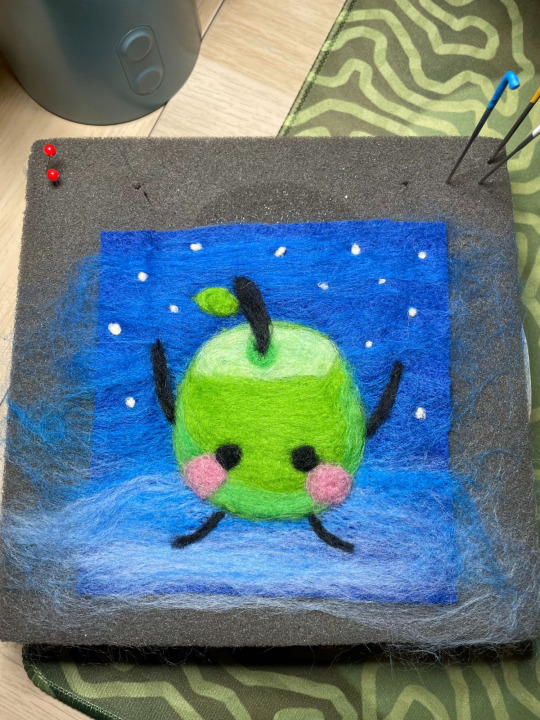
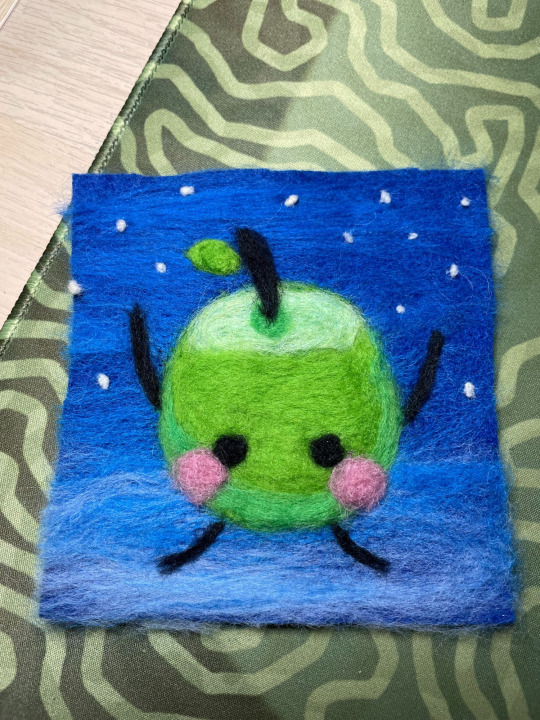
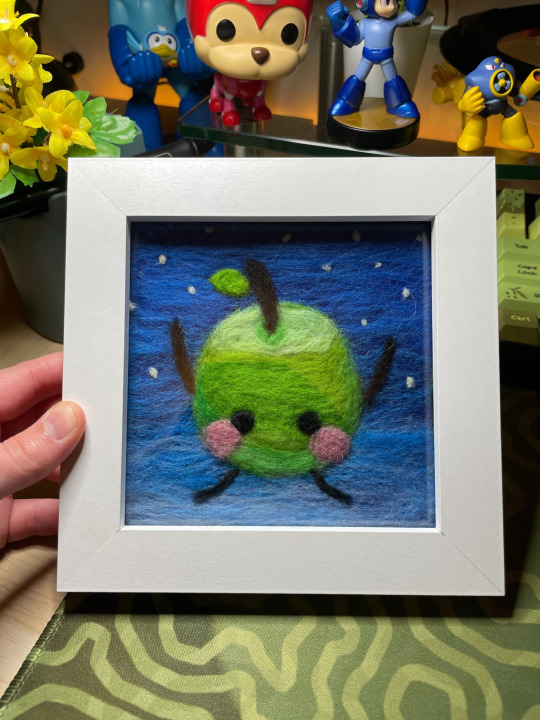
I completely forgot to post this here!!! I've been needle felting for years, but have never done any "2D" felting, so I made this as a Christmas gift for my friend.
It was so much faster and easier than felting little sculptures lol, those usually take me several days whereas this took about 2ish hours 😗
#stardew valley#needle felting#junimo#2D is in quotes because you can technically still layer wool and create depth lol#I don't know what else to call this style of felting#painting with wool?
129 notes
·
View notes